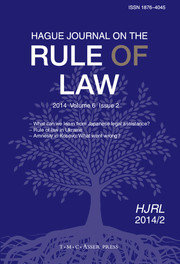Article contents
Security and the Rule of Law in Colombia and Guatemala: Priorities, Trade-offs and Interdependencies
Published online by Cambridge University Press: 26 March 2012
Abstract
The ‘liberal peace agenda’ assumes that security sector reform (SSR) and the consolidation of the rule of law are both interdependent and complementary. Evidence from Colombia and Guatemala suggests, however, that in practice conflict resolution and peace-building strategies may prioritize attaining national security over the rule of law (Colombia) or taking measures to strengthen the rule of law only when faced with serious post-conflict insecurity affecting elites and the hollowing out of the state by organized crime and criminalized elite competitors (Guatemala). Peace-builders should therefore pay particular attention to strengthening justice systems and protecting fundamental rights of citizens and victims of state and non-state violence. Strategies to increase the state's security capacity and to reform the security sector should be synchronized with an overarching rule of law agenda. In violent settings where insecurity has many faces and cuts across the blurred lines between legality and illegality security remains elusive without a stronger rule of law.
Keywords
- Type
- Articles
- Information
- Hague Journal on the Rule of Law , Volume 4 , Special Issue 1: Special Issue on Security Sector Reform and Rule of Law , March 2012 , pp. 135 - 157
- Copyright
- Copyright © T.M.C. Asser Press and the Authors 2012
- 2
- Cited by




